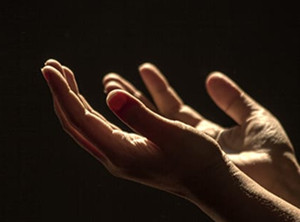Prayer is a theme that runs all throughout the Gospel of Luke. It is something that keeps Jesus on course through his journey. It is what focuses his vision. As we watch Jesus at prayer we observe that for him prayer acknowledges our dependence on our God in the present and for our future. Words and language are important only insofar as they lead us to understand the underlying Reality. Jesus' answer to His followers about prayer is very simple. He has told us about His Father. We praise His name, we ask, we seek, and we knock at the door in full confidence knowing He will answer our needs. And we love one another and forgive one another as He has already loved and forgiven us. This is an awful lot to unpack from such a short prayer.
 The Lord's Prayer offers us a glimpse of Jesus' understanding of the Father - his awe and reverence for God, his childlike, simple-yet-strong faith in his Father and his strength to go bravely through life no matter what comes. It sums up his entire teaching.
The Lord's Prayer offers us a glimpse of Jesus' understanding of the Father - his awe and reverence for God, his childlike, simple-yet-strong faith in his Father and his strength to go bravely through life no matter what comes. It sums up his entire teaching.
It is one of the most revered prayers in the New Testament. We learned to mouth the words in our infancy and continue to pray them throughout our adult lives. It appears everywhere in the the life of the community - in liturgy and sacraments, in public and private prayer. It is a prayer that every Christian treasures and the first thing we notice is that it is communal in nature. It is a “we” prayer. “Give us,” “forgive us” and “subject us not to the trial.” It is a prayer of the community, for the community.
This becomes most evident in the request, "Give us each day our daily bread." This is a plea of the poor for the poor. The poor are important throughout Luke’s gospel. The poor, who respond to the Lord in their daily lives, depend on God for each day's sustenance. But this request is also an awakening moment for a community that is called to share all things in common. We’re invited to consider what nourishment or help we actually need - nothing more, nothing less. It's also a challenge to reflect on what we’re doing to provide for the needs of others.
Our national response to the poor who cry out for daily bread is not good at all. It is disgraceful. We hear the poor and the vulnerable crying out to God for the help that we as a nation and as a Christian community should be doing something about. Our faith tradition as Christians calls us to put the needs of the poor and the vulnerable before all else. If that were done, such a community would have no poor.
When we pray the prayer that Jesus taught we ask that God will do the seemingly impossible – make the ordinary holy, make the reign of divine justice and peace a reality, lift up the voices of the oppressed, provide whatever is needed in the moment, forgive those who need to be forgiven (including ourselves), and save us all from the time of trial and temptation.
There is no action more fundamental to faith than prayer. Prayer is not some magical exercise. And it is never wasted. Every time we pray, we remember who we are and that we are beloved daughters and sons of God. And every time we pray, we grow more sensitive and attentive to the beauty and power of God’s action among us. It takes courage to pray the Lord’s Prayer, to truly believe these familiar and yet radical words.





